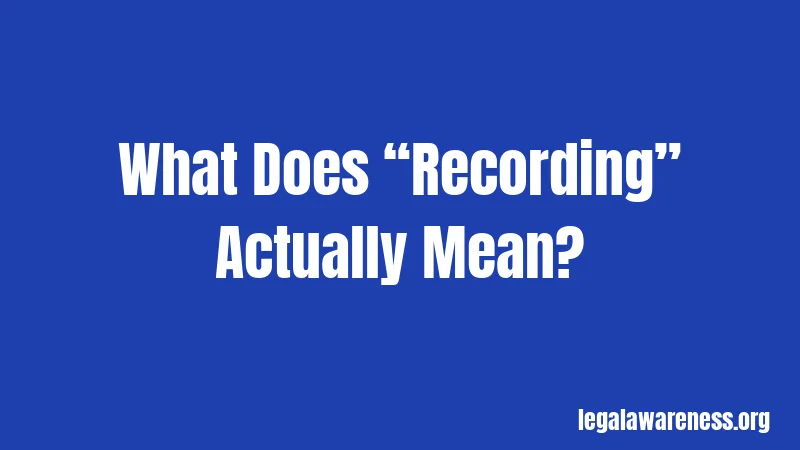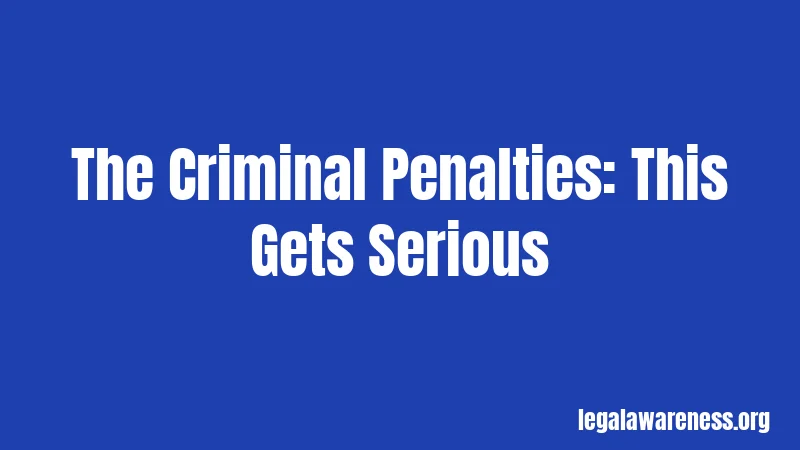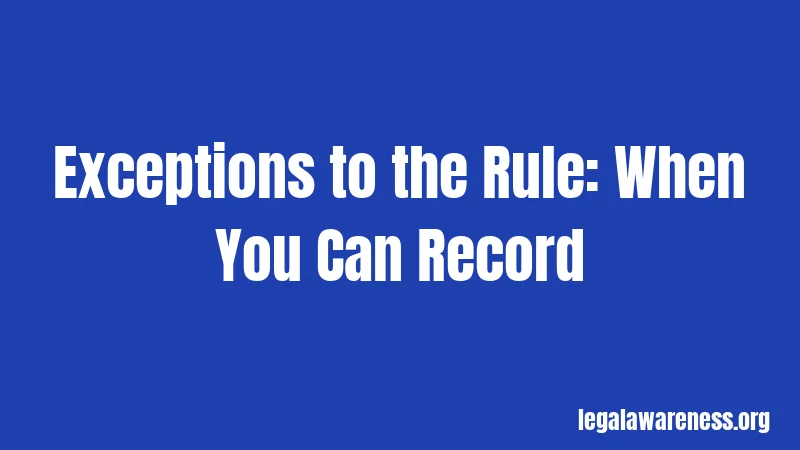Illinois Recording Laws in 2026: What You Absolutely Need to Know
You’ve probably recorded a conversation or a video before without thinking twice about it. Most people have. But here’s the thing that surprises a lot of folks: Illinois has some of the strictest recording laws in the entire country. Seriously.
In Illinois, recording someone without their permission can actually be a crime. Not a small fine. A real felony. The state is what’s called a “two-party consent” state, and that changes everything about what you can legally record. Let’s break down exactly what the law says and what it means for you.
What Does “Recording” Actually Mean?

When we talk about recording laws, we’re talking about capturing someone’s voice or any audio they produce. This includes phone calls, in-person conversations, meetings, video calls, and even secret recordings. Yep, that includes conversations you might think are private.
Here’s what matters: if you can hear someone’s voice and you’re capturing it in any way, you’re recording them. It doesn’t matter if you’re using your phone, a hidden microphone, a voice recorder, or even just hitting record on your computer’s camera. The law treats it all the same.
The Golden Rule: Get Permission First
Okay, this is the part that trips up most people. In Illinois, before you record any conversation where you can hear another person’s voice, you need that person’s permission. Not just one person. Both people. That’s the two-party rule.
You know how in some states you only need to be recording if you’re part of the conversation? Illinois isn’t like that. Stay with me here, because this matters.
Let’s say you’re having a phone call with your friend. You want to record it for your records. Even though it’s your phone, on your phone, you still need your friend to agree that you can record. That’s the law. Your own participation in the conversation isn’t enough.
What about a meeting at work? Same deal. Even if you’re sitting right there in the meeting, you can’t secretly record it. Everyone involved needs to know and agree.
The Criminal Penalties: This Gets Serious

Here’s where things get intense. Illinois doesn’t treat recording violations as a minor mistake. The penalties can be genuinely harsh.
Recording someone without consent in Illinois is a felony. A Class 2 felony, to be exact. This isn’t just about fines. You’re looking at possible jail time. Depending on your specific situation and whether you’ve done this before, you could face up to five years in prison.
Wondering if there’s a fine too? Yes. You could be charged with fines up to $25,000. That’s not pocket change. Think of it like a combination of serious consequences: jail time, a felony record, and major financial penalties all rolled into one.
But wait, there’s more. If you record someone without consent and then share or distribute that recording? The penalties can get even worse. Some situations can bump it up to a Class 1 felony, which means even more prison time.
Where the Two-Party Rule Applies
This is important, so read carefully. The two-party consent rule applies to pretty much any conversation in Illinois where you can hear someone else’s voice or they can hear yours.
Phone calls are obvious. If you’re on the phone with someone and want to record that call, both of you need to agree. In-person conversations work the same way. Video calls, voice messages, recorded meetings, interviews, therapy sessions, confessionals, police interrogations. All of it falls under the rule.
Here’s something that confuses people: what if you’re recording someone in public? Like recording someone talking at a bus stop or a restaurant? Honestly, it gets complicated fast. The legal situation changes depending on whether that person has a reasonable expectation of privacy in that specific location. A busy street might be different from someone having a private conversation in a corner booth. But the safest move? Always get permission first.
You’re not alone, this confuses a lot of people. The rule is really broad, and the courts have interpreted it pretty strictly.
Exceptions to the Rule: When You Can Record

Okay, here’s the good news. There are some situations where you can record without getting permission first. Not many, but they exist.
If you’re a law enforcement officer and you’re recording a conversation as part of your job, different rules might apply. Police have specific authority under certain circumstances. But even then, there are limits. They still need to follow other laws about wiretapping and surveillance.
Recordings of public judicial proceedings are generally legal. If you’re in a public courtroom, you can typically record what’s happening. But some judges have specific rules about this, so check first.
If you’re recording something for your own personal use and there’s already a recording happening that everyone knows about (like a meeting that’s being broadcast or recorded), the situation might be different. But this gets into gray areas really fast.
Honestly, this is probably the most important rule: when in doubt, ask first. The safe choice is always to get permission. It takes 30 seconds to say “I’d like to record this conversation, is that okay?” It could save you from a felony charge.
What About Workplace Recordings?
Many people ask about recording at work. The answer? It’s still governed by the two-party consent rule, but there’s an extra layer to consider.
Your employer might have specific policies about recording. Some companies strictly prohibit it. Some allow certain types of recording. Check your employee handbook or ask your HR department what the actual policy is at your workplace.
But here’s the thing: even if your employer allows recording, you still need the consent of everyone in the conversation. You can’t hide behind your company’s permission. If your boss is okay with you recording your own performance review, that’s great. But you still need the person reviewing you to agree to the recording.
Recording your coworkers without permission? That’s still a felony under Illinois law, regardless of what your employee handbook says.
What About Your Own Calls?
This is where people really get confused. You might think that since it’s your own phone and your own recording device, you can record whoever you want. But that’s not how Illinois law works.
The law doesn’t care whose device is being used. It doesn’t matter if it’s your phone, your computer, or your secret recorder hidden in your pocket. What matters is that you’re recording someone else’s voice without their permission. That’s the crime.
The only person you can unilaterally record without permission is yourself. But the second another person’s voice enters that recording, you need their consent. Pretty straightforward, right?
Police and Law Enforcement Recordings
If you’re recording a police officer or law enforcement official, the two-party rule still applies. This is one area where people get really confused and make serious mistakes.
You cannot secretly record a police officer. If a cop is talking to you and you secretly record that conversation without telling them, that’s a violation of Illinois recording law. Yes, really.
However, there’s some nuance here. Illinois has been working through some legal battles about this specific situation. Some say there’s a difference between recording police and recording regular citizens because police have less expectation of privacy in public. But honestly? Don’t rely on that. Tell the officer you want to record. If they agree, you’re fine. If they don’t, you have to stop.
The safest approach is simple: tell the police officer or person you want to record them. Make it clear, make it obvious. “I’d like to record this conversation. Is that okay?” Most situations will be fine after that.
Recording in Your Own Home
Okay, here’s a common scenario. You’re recording a conversation in your own house. Does the privacy of your home make a difference?
Short answer: not really. The two-party rule still applies. You can’t secretly record someone in your own home without their permission, even if it’s your property.
Let’s say your landlord is visiting to show a potential tenant around. They’re having a conversation with you about maintenance issues. You can’t secretly record them. Even though it’s your home, they have a reasonable expectation that you’re not recording them.
The location matters less than the consent of the people being recorded. That’s the core principle.
Penalties Beyond Prison Time
We already talked about jail and fines. But there are other consequences too.
A felony conviction goes on your permanent record. This affects your ability to get jobs, housing, professional licenses, and more. A single recording violation could derail your career depending on what you do for work.
You might also face civil lawsuits from the person you recorded. They could sue you for damages. The criminal case is separate from any civil lawsuit. So you could face both criminal charges and a lawsuit seeking money damages.
If you distributed the recording without consent, you might face additional charges related to privacy violation or illegal wiretapping. Each distribution could be a separate offense.
The financial hit goes way beyond any fines. Lawyers, court costs, and civil settlements can add up to tens of thousands of dollars.
What If You Made a Mistake?
Nobody’s perfect. Let’s say you recorded someone by accident or you didn’t realize the law was this strict. What should you do?
First, stop immediately. Delete the recording if you have it. Don’t share it with anyone. Don’t post it online. Don’t tell people about it. The fewer people who know, the better.
If the person found out and is upset, you might want to reach out and apologize. Take responsibility. Explain that you didn’t realize the law was this strict and that you’ve deleted everything.
In some cases, having the other person’s forgiveness or written agreement retroactively might help if there’s any legal dispute. It’s not a perfect solution, but it’s something.
If you’re worried you might face charges, talking to a lawyer sooner rather than later is smart. A lawyer can advise you on what to do next and whether you need to take action to protect yourself.
Recording In Public Spaces
People often ask if recording in public places is different. Restaurants, parks, streets, shopping centers. Does public mean you don’t need consent?
Not really. The two-party rule generally still applies, even in public spaces. The key question is whether the person being recorded has a reasonable expectation of privacy.
If someone is having a quiet conversation with a friend in a coffee shop, they probably have a reasonable expectation of privacy. You can’t secretly record them just because you’re in a public place.
But if someone is giving a speech to a crowd, or shouting at someone on a street corner where everyone can hear, the situation is different. They’ve basically put their voice out there for everyone. Recording that might be legal.
The problem is this line is super blurry. Different judges might interpret it differently. The safest rule? Ask first. If you want to record someone in public, tell them. Get their permission. You won’t go wrong.
Recording Over Video Calls
Zoom calls. FaceTime. Google Meet. Video conferences. Teams calls. These all involve recording audio, and the two-party consent rule definitely applies.
If you’re in a work meeting on Zoom and you want to record it, everyone on the call needs to know. Companies often put up a notice at the start saying “this call is being recorded,” which gives everyone a chance to agree or leave.
But if you secretly record someone’s Zoom call without telling them? That’s just as illegal as recording a phone call. Same penalties. Same felony charge.
This is especially important to remember if you’re recording a personal call or a therapy session over video. Always get permission first.
FAQs About Illinois Recording Laws
Can I record a conversation I’m part of if I have permission from the other person? Yes. As long as both people agree to the recording, it’s legal. The consent needs to be clear and informed. The other person should understand they’re being recorded.
What if someone tells me they’re recording but I don’t want to be recorded? You can ask them to stop. You can hang up the phone or end the conversation. You don’t have to participate in a conversation that’s being recorded if you don’t want to.
Can I record my boss or manager? Not without their permission. Same two-party rule applies. Even if you’re trying to document something for legal protection, secret recording is not the answer in Illinois.
What if I accidentally recorded someone? Delete it immediately. Don’t share it with anyone. If possible, explain to the person that it was accidental. If you’re worried about legal consequences, talk to a lawyer.
Is texting and sending voice messages included in the recording law? Voice messages and audio messages fall under the law if you’re recording conversations. If you’re sending someone a pre-recorded message they agreed to receive, it’s different. But recording their response without permission? That’s still illegal.
Final Thoughts
Illinois recording laws are strict. Seriously strict. The two-party consent rule means you need to get permission from everyone before you record them. No exceptions for recording your own phone, your own property, or public spaces.
The penalties are real. Felony charges, prison time, thousands in fines, civil lawsuits, and a criminal record that affects your future. It’s not worth the risk.
The good news? Following the law is incredibly simple. Ask first. “I’d like to record this conversation, is that okay?” That’s it. If the other person says yes, you’re good. If they say no, don’t record.
When in doubt about a specific situation, talk to a lawyer. Recording laws can get complicated in edge cases. A lawyer who knows Illinois law can tell you exactly what’s allowed and what’s not.
Stay informed, stay legal, and when you want to record something, just ask. It takes a few seconds and keeps you on the right side of the law.
